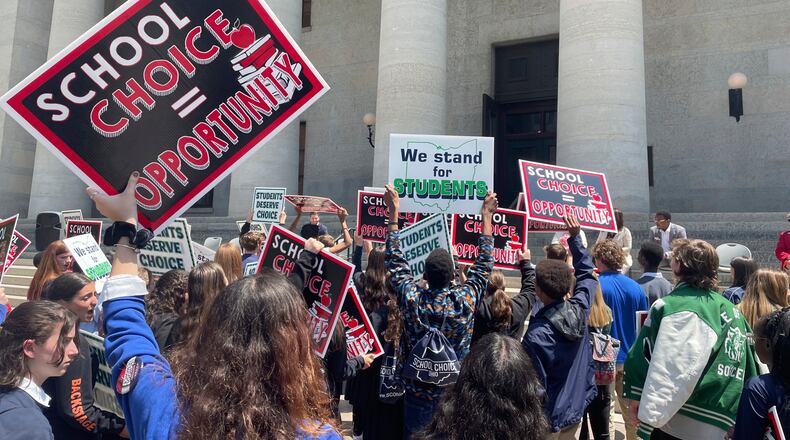Key education policies in the state include the school funding model, private school vouchers, gun rights and LGBTQ+ rights. The Statehouse has leaned conservative on these and other topics, as Republicans have held a super-majority.
Statehouse race
Senate District 6′s seat is currently held by Niraj Antani, R-Miamisburg. But in 2022 when the statehouse redrew district boundaries, the district changed from a Republican-leaning district to a Democratic-leaning district.
Blackshear is on his second term in the Ohio House representing District 38, which covers Dayton, Trotwood, Riverside and parts of Huber Heights. The bills he sponsored during his term dealt with designating days for counseling awareness and military remembrance, banning mass casualty weapons, mental health days for students, tax payments on foreclosed properties and a motor fuel testing program.
McGuire is a member of the Ohio Board of Education. She previously served as the board president in 2022 and 2023. Ohio Gov. Mike DeWine appointed McGuire to District 3, which covers Preble, Montgomery, Butler and Miami counties, in 2016, and she was reelected into the position in 2018 and 2022.
Many of the items McGuire voted on as president were about teacher licensing, but not all of them. In December 2022, the board passed member Brendan Shea’s proposal to send a letter to all the districts in Ohio letting them know of the board’s opposition to Title IX proposals under President Joe Biden’s administration that would increase protections for LGBTQ+ youth in schools. McGuire, along with Shea, voted in favor of the resolution.
In an interview with the Dayton Daily News, Blackshear said his priorities include more funding for public schools and restricting access to guns to help avoid more school shootings.
“A lot of these schools have to put levies on a ballot because they’re running out of money,” Blackshear said.
He added, “My only issue is when we are taking public dollars to fund those private and charter schools, the public dollars that our public schools desperately need.”
Blackshear wants to improve access to career technology education, which has become increasingly popular as kids don’t have to take on college debt to get a job making above minimum wage, and the state wants more people with trade skills.
McGuire said her main priority is improving student outcomes. She suggested ideas like providing resources to schools to improve their outcomes and building more workforce opportunities for kids outside of colleges.
“We need direct contact with the joy of teaching and the joy of learning to release the future leaders for Ohio,” she said.
But she questioned the need for additional funding to public schools.
“We probably need to look at how the resources are being used, and we need to engage stakeholders with the aim in mind of improving student outcomes,” she said.
McGuire called for mentoring families, safe environments for kids, safe communities and reviewing discipline policies.
“One thing I’ve learned about children, they care what you know,” she said. “When they know you care and you hold them accountable, they respond when they feel that accountability means I will do better as a child.”
School funding
One of the biggest issues in the Ohio Legislature, now and for decades past, has been school funding. Public schools say they don’t have enough money, now that their COVID-19 federal funding is running out, to continue operating and paying for schools as they currently run.
The Centerville school district is currently asking voters to approve a school levy for the third time. John Doll and Dr. David Roer, two of the district’s board of education members, have said publicly they think the state should be providing more funding to public schools so the district does not have to constantly go back to the voters.
Last school year was the first year the state offered universal vouchers for private school families. Any Ohioan who makes up to 450% of the poverty line — $150,000 for a family of four — is eligible for a full EdChoice Expansion Scholarship. Ohio families who make more than that are eligible for at least 10% of the scholarship.
Those opposed to school vouchers argue vouchers take money away from traditional public schools. Those for vouchers argue the state should be supporting more choices for families.
About the Author



